Potential spoilers ahead. You’ve been warned.
STEVE CARELL
Film: Foxcatcher
As we approach the last two entries on my list, it becomes a little more difficult to discuss specific performances, because there are so many strong contenders. If I have to single out one film to go more in-depth in than others, it would be Foxcatcher. I believe it is Carell’s most remarkable performance and it remains his only (as of yet) Oscar-nominated performance. However, my primary selection of Foxcatcher in no way diminishes the breadth of his dramatic work. Here’s a little side note. My favorite actor of all time is Robin Williams. The simplest reason is that I think he is the epitome of an actor who can work in any genre with the same successful results. Williams will be my next (and final) posting, but I felt the need to bring him up right now. I truly believe that Steve Carell is the closest living actor to Williams, in that he has a penchant for being able to cross genres with great success. That’s why I’ve waited so long to finally talk about Carell.
Steve Carell’s rise is an interesting one. He started his career as a bit player on the short-lived The Dana Carvey Show and as a correspondent on The Daily Show and then moved into film with supporting parts in Bruce Almighty and Anchorman: The Legend of Ron Burgundy. In the spring of 2005, he debuted as inept boss Michael Scott in NBC’s American version of The Office. After a six-episode dud of a first season, the show was on the bubble, potentially making it the fourth sitcom for Carell to get the ax after its freshman season. However, that didn’t happen. Something noteworthy happened. In August 2005, The 40-Year-Old Virgin (which he co-wrote with director Judd Apatow) was released and quickly became a huge box office and critical hit. NBC realized that they now had a major movie star under contract and despite any initial trepidation, renewed the show for a second season. As expected, the viewership rose significantly. But most importantly, the writers of The Office saw Carell balance tender moments with humor and changed the character of Michael Scott from an inept, borderline unlikable boss, to a still inept, but caring boss whose big heart and impulsive behavior lead him into unpredictable situations. The change was for the better and the show became an awards darling, winning a Golden Globe for Carell.
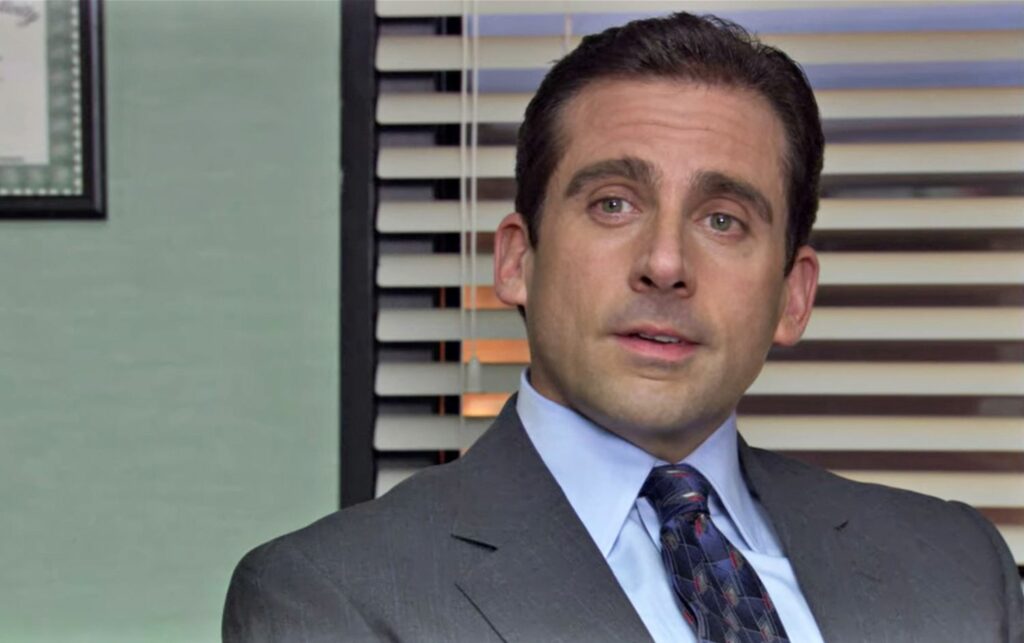

During his time on The Office, Carell starred in movies like Evan Almighty, Get Smart, and Date Night. After leaving the show in 2011, Carell pursued a full-time film career, starring in Dinner for Schmucks, The Incredible Burt Wonderstone, and Seeking a Friend for the End of the World, as well as voicing Gru in the Despicable Me franchise. About the time he left The Office, Carell began to try his hand with more serious work. 2011’s Crazy, Stupid, Love may have been a rom-com, but the film and Carell’s performance is filled with heart. The following year, he played a marriage counselor to Meryl Streep and Tommy Lee Jones in Hope Springs, and in 2013, he played the manipulative boyfriend to the protagonist’s mother in the coming-of-age drama, The Way, Way Back. However, it was Steve Carell’s performance in 2014’s Foxcatcher that cemented his arrival as a serious actor.
In Foxcatcher, Carell plays the real-life John du Pont, an eccentric wrestling enthusiast and millionaire heir to the du Pont family. With a desire to help the US Wrestling team win Gold in Seoul in 1988, du Pont hires Olympic gold medal wrestler Mark Schultz (Channing Tatum) to get the team in shape. At first unwilling to move to Foxcatcher Farm to coach without his Olympic gold medal-winning brother Dave (Mark Ruffalo), Mark soon looks at it as an opportunity to get out from his shadow. As training commences, Mark begins to excel at Foxcatcher, winning gold in the 1987 World Wrestling Championships. The bond between Mark and du Pont grows to be something resembling a mentor-mentee relationship, an outcome du Pont hoped for. One night, while riding in a private helicopter to a fundraising event, du Pont offers Mark a bump of cocaine. Though reluctant to try it at first, Mark eventually relents at du Pont’s insistence. This turns out to be his downfall, as he soon becomes addicted. As time goes on, du Pont finds Mark to be unreliable and finally convinces Dave to join them at Foxcatcher to help coach the team. Mark sees this as a betrayal and refuses to train with Dave, opting to train alone. With his self-esteem damaged, he loses his first match at the Olympic Trials and goes on a self-destructive binge that includes destroying the hotel room and eating everything in sight. Dave confronts him and quickly helps him get back into his weight class. Mark eventually qualifies for Seoul but tells Dave that he can’t stay at Foxcatcher after the Olympics. In Seoul, Mark purposely loses his match and leaves the estate.
Not wanting to relocate his family, Dave agrees to stay at Foxcatcher, which is now the official training site of the American Wrestling team. In the years after Mark’s departure, du Pont’s mental health begins to deteriorate, especially after the death of his mother (Vanessa Redgrave). du Pont begins to think that Dave is out to get him. One wintry afternoon, du Pont drives up to Dave’s place. He asks Dave “Do you have a problem with me,” before shooting him three times, killing him. Despite the film being based on real events, Dave’s murder is no less devastating. The film ends by telling us that Dave was posthumously inducted into the Wrestling Hall of Fame, Mark retired from professional wrestling after Seoul, and du Pont died in prison in 2010.
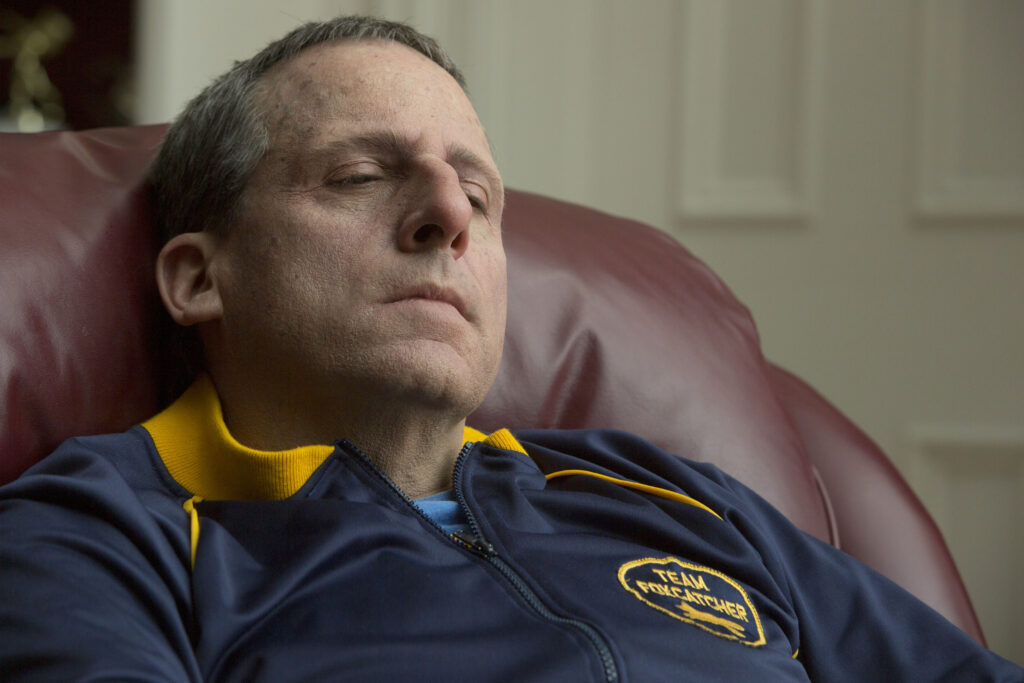
I used the word “remarkable” in describing Carell’s performance, and I stand by it. Another word I would use is “deceiving.” When Carell first appears on screen as du Pont, it’s kind of hard to take him seriously. He’s under a lot of makeup. You can still tell it is Carell, but you would almost have to do a double-take. It seems like the start of an SNL sketch where he’s playing the real-life version of his Despicable Me character. It’s certainly jarring at first, but the more the film progresses and you accept Carell as du Pont, the more unsettling his portrayal feels. Carell perfectly captures du Pont’s eccentricities, but always approaches him from a human level. He truly makes you feel sorry for du Pont. It’s almost heartbreaking when he tells Mark that he only had one friend growing up and that when he was 16, he discovered his mother had been paying that “friend” to spend time with her son. It’s because of this, that until Mark gets involved with drugs and becomes unreliable, you feel happy that du Pont has found a friend in Mark. I feel like I should mention that Bennett Miller, the director, also directed Moneyball, the film responsible for giving Jonah Hill his dramatic break.
Speaking of his mother, she has a tremendous impact on his life, and not in a good way. A world-class equestrian, she disapproves of wrestling, telling her son, “Wrestling is a low sport and I hate seeing you being low.” Despite that, du Pont is always trying to win his mother’s favor. One afternoon, du Pont invites his mother to training, where he gives a somewhat motivational speech to the team and acts like the head coach. Embarrassed by her son acting “low,” she leaves after a few minutes. This disapproval accelerates du Pont’s mental health decline. It is a testament to Carell’s performance that he can at once make us feel sympathetic and unnerved. The interesting part is that in doing my research, du Pont had a history of mental health issues his entire life, including a couple of episodes that are not even mentioned in the film.
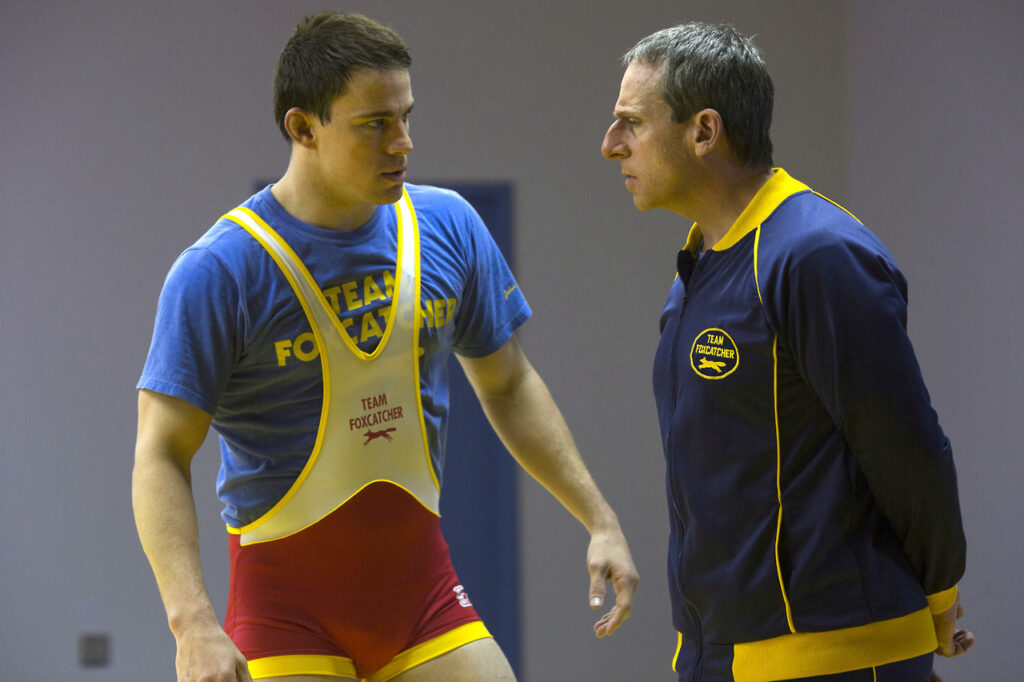
Wrapping up about Foxcatcher, it is amazing to me how time affects your perception of a piece of artwork. I was in tenth grade when this movie came out and I saw it in theaters with my dad, I believe. I remember thinking Carell did a good job, but the movie was dull. Yet, when I watched it nearly a decade later in preparation for this post, I found it to be the exact opposite. Yes, the pace is a little slow, but what 16-year-old me didn’t realize is that this film is a character study about a mentally ill millionaire, an Olympic gold medalist trying to get out of his brother’s shadow, another Olympic gold medalist trying to balance his wrestling ambitions with his family life, and the relationships between the three of them. Carell was more than deserving of his Oscar nomination (competing against Michael Keaton in Birdman), as was Mark Ruffalo (Best Supporting Actor).
After the success of Foxcatcher, Carell would continue to give us dramatic performances, oftentimes mixing them with comedy. During this time, he made the little-seen Battle of the Sexes, Last Flag Flying, and the critically panned Welcome to Marwen. I think the most notable movies he made during this time were The Big Short and Vice, both directed by Anchorman director Adam McKay, as well as the drama Beautiful Boy. In Adam McKay’s highly divisive film about Dick Cheney, Carell plays Donald Rumsfeld. Notably, he collaborated with McKay again, but his performance is forgettable, especially in comparison to costars Christian Bale, Amy Adams, and Sam Rockwell. Beautiful Boy reminds me a lot of Michael Keaton’s movie Clean and Sober, except in this case, Carell plays the father of a young drug addict (Timothee Chalamet). It was a noble effort on Carell’s part, but like Sober, the movie is just plain boring. It’s two hours of Timothee Chalamet relapsing and Carell responding as a concerned parent.
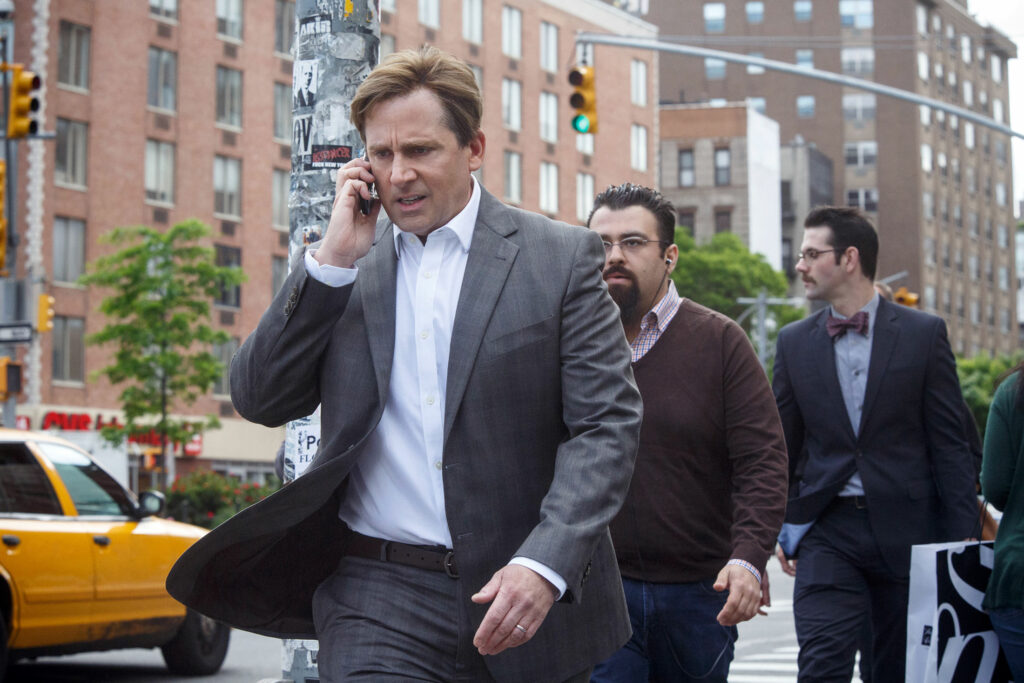
I think it would be fair to say that his most well-received performance post-Foxcatcher would be The Big Short. In Adam McKay’s film about the housing bubble and the outsiders who caught it, Carell plays Mark Baum. Mark is a loud-mouthed cynic, who leads a small group of investment bankers who are equally distrustful of big banks. Mark is also very angry, but underneath the anger is grief. Carell is perfectly able to capture that anger, grief, cynicism, and humor. To McKay’s credit, despite dealing with some heavy and at times confusing subject matters, the film is still very much a comedy. He has strong chemistry with his bankers, but it is a joy to see him play off of his Crazy, Stupid, Love co-star Ryan Gosling as the energetic banker Jared Vennett. The film was a surprise hit, earning a handful of Oscar nominations, including Best Picture. Director Adam McKay and co-writer Charles Randolph won Best Adapted Screenplay. It always makes me laugh to think that the director of Step Brothers has an Oscar. Anyway, back to Carell. It may have been his co-star Christian Bale who got the Oscar nomination, but Carell was nominated for a Golden Globe for his performance.
Before I wrap up, I need to address one more film that I’ve intentionally saved for last: Little Miss Sunshine. The film follows seven-year-old Olive and her dysfunctional family as they travel to Florida in a beaten-up VW Bus so she can compete in the Little Miss Sunshine Beauty Pageant. In the film, Carell plays Olive’s uncle, Frank. Frank is a gay highly respected Proust Scholar, who, after a nasty breakup, attempts suicide. Carell can balance the dark humor perfectly with the drama required. You can see the pain in his eyes, but whether he uses it as a coping mechanism or not, he is often quite funny. It’s fun to witness the adversary relationship between him and his brother-in-law, Richard (Greg Kinnear), but the relationship between him and his nephew Dwayne (Paul Dano), is incredibly poignant and powerful. In the end, the film rightfully won the Oscars for Original Screenplay and Best Supporting Actor (Alan Arkin). Arkin was well deserving of his nomination, but I think Carell was equally deserving.
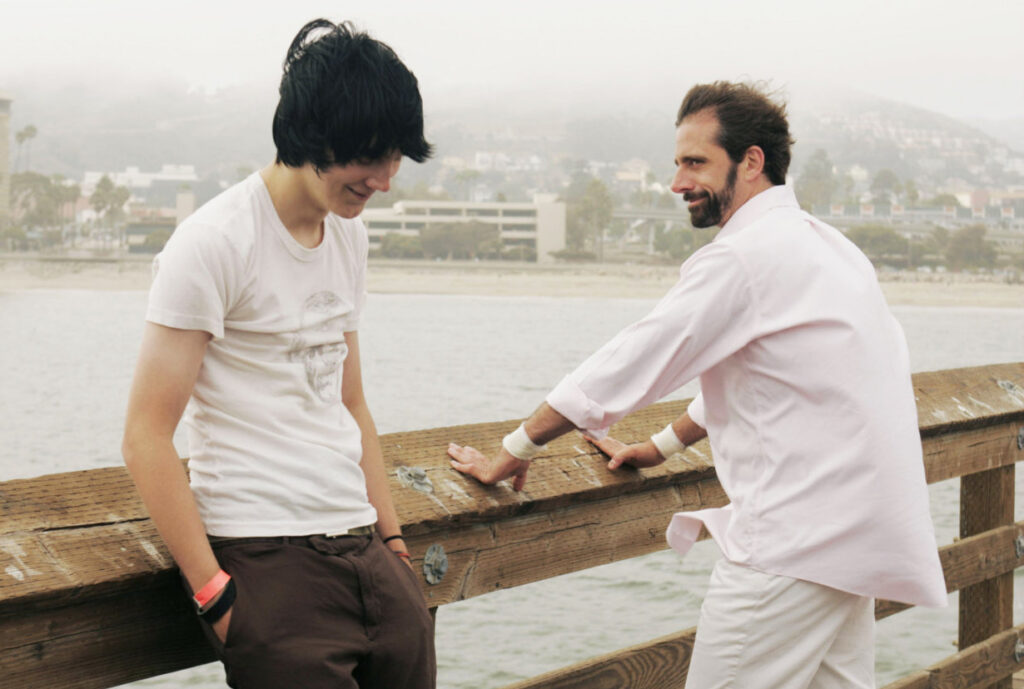
John du Pont aside, this is my other favorite Steve Carell performance. The reason I saved this film for last is because this is the outlier in the timeline of his career. This film was released in 2006, nearly a decade before he transformed his career. He shot this movie before The Office and The 40-Year-Old Virgin even premiered. In fact, the producers were on the fence about hiring him because he was an unknown. By the time the film was released, however, he was a major star and the studio milked that exposure. So, to anyone who was amazed by Carell’s second act, I say don’t be too surprised. He demonstrated his acting abilities early on, it just so happened that his public persona changed and he became associated with his Michael Scott character. This is a random thought. I couldn’t fit it in organically, but if you haven’t seen it, check out Dan in Real Life. It’s one of Carell’s forgotten gems from his time on The Office.
I know this was a long post, but I thank you for reading it. My final post will be on Robin Williams, so that might be just as long. If you haven’t already, I hope you can now see the validity of why I think Carell is the modern-day Robin Williams.
Check this out: Foxcatcher – “I Want To Win Gold” Clip